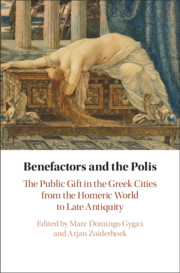 Benefactors and the Polis
Benefactors and the Polis Book contents
- Benefactors and the Polis
- Benefactors and the Polis
- Copyright page
- Contents
- Figures
- Tables
- Contributors
- Acknowledgements
- Abbreviations
- Introduction
- Part I Benefiting the Community in Early Greece
- Part II Classical Benefactors
- Chapter 3 Classical Athens and the Invention of Civic Euergetism
- Chapter 4 The Scale of Benefaction
- Part III Hellenistic Benefactors
- Part IV Benefactors and the Polis under Rome
- Part V The Decline and Fall of Euergetism?
- Conclusion
- Index
- Index locorum
- References
Chapter 3 - Classical Athens and the Invention of Civic Euergetism
from Part II - Classical Benefactors
Published online by Cambridge University Press: 21 January 2021
- Benefactors and the Polis
- Benefactors and the Polis
- Copyright page
- Contents
- Figures
- Tables
- Contributors
- Acknowledgements
- Abbreviations
- Introduction
- Part I Benefiting the Community in Early Greece
- Part II Classical Benefactors
- Chapter 3 Classical Athens and the Invention of Civic Euergetism
- Chapter 4 The Scale of Benefaction
- Part III Hellenistic Benefactors
- Part IV Benefactors and the Polis under Rome
- Part V The Decline and Fall of Euergetism?
- Conclusion
- Index
- Index locorum
- References
Summary
Athens represents a special case in the history of Greek public benefactions. It is probably the polis that most resisted the emergence of civic euergetism, that is, the establishment of an organized exchange of benefactions for honors between polis and citizens. At the same time, no other classical polis contributed so much to the development of the practice and to its transformation into a defining institution of the Hellenistic age. This chapter examines these two sides of the history of Athenian euergetism in order to explain the widespread integration of citizens into an institution born before the classical period to regulate the relationship between poleis and foreigners. It deals with the reasons for the opposition to donations and honors for citizens, the factors that contributed to overcoming resistance to euergetism, and the elitist content of classical civic euergetism. Finally, it discusses some developments that counterbalanced this elitist component: the ‘democratization’ of euergetism through grants of honors to non-wealthy citizens, the organization of epidoseis, and other measures that served to prevent the rise of a class of great financial benefactors, along with the relaxation of this policy in the time of Lycurgus.
Keywords
- Type
- Chapter
- Information
- Benefactors and the PolisThe Public Gift in the Greek Cities from the Homeric World to Late Antiquity, pp. 69 - 95Publisher: Cambridge University PressPrint publication year: 2021
References
- 1
- Cited by
